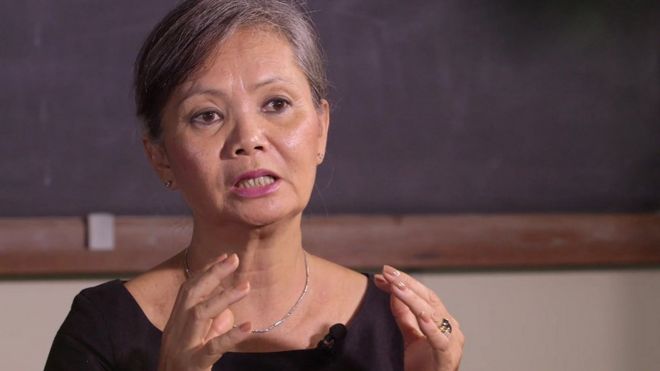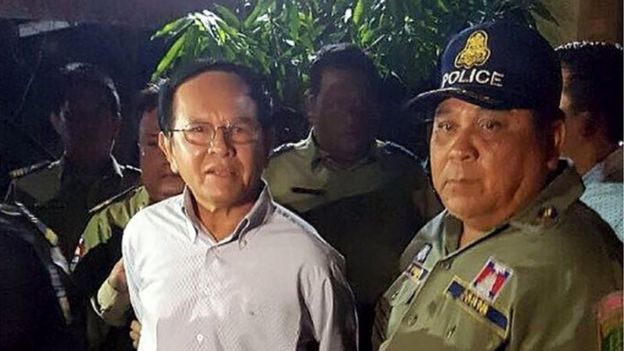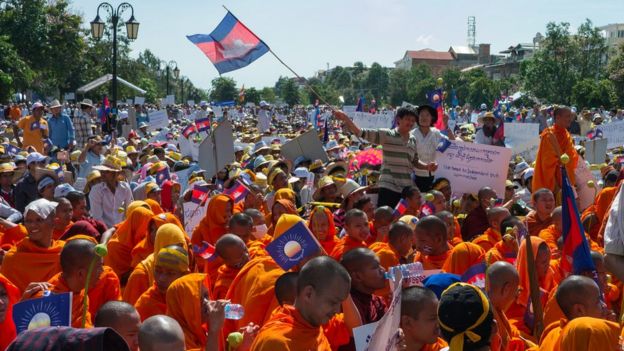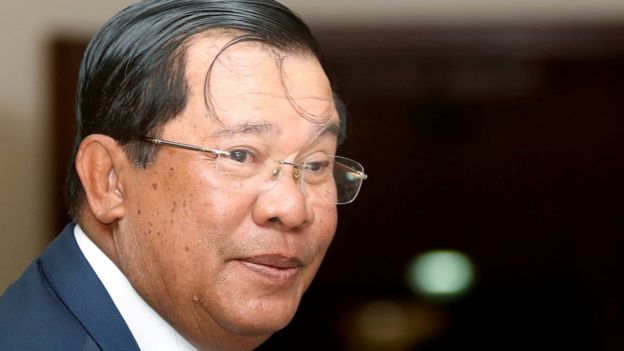 |
| Mu Sochua says she was warned she would be arrested |
Cambodia opposition politician Mu Sochua 'feared arrest'
BBC News | 6 October 2017
Mu Sochua, one of Cambodia's best-known politicians and deputy leader of the opposition Cambodian National Rescue Party (CNRP), has fled into exile after being warned she was about to be arrested on charges of treason. She spoke to BBC South-East Asia correspondent Jonathan Head in Bangkok - the exact location is being concealed for her safety.
"To flee the country has never been part of my agenda," says Mu Sochua, sitting in a bare room in Bangkok where she is in transit to another, as yet undisclosed, destination.
"It is a choice I thought I would never have to make. It is a very painful choice."
Earlier this week she was warned, she says, by sources close to the government that she would be arrested by the weekend.
Last month her party leader, veteran human rights campaigner Kem Sokha, was taken from his home by 200 police officers and charged with treason. Last week Prime Minister Hun Sen said others would be arrested on the same charge.
 AFP/GETTY IMAGES
AFP/GETTY IMAGES
"I no longer felt safe. What I was afraid of being captured and being silenced, put in jail, and having my case go through our kangaroo courts for months and months," said Mu Sochua.
"We don't have months to waste. Elections for Cambodia are scheduled for 29 July 2018. So I intend to have my voice heard."
Harassment of opposition figures is nothing new in Cambodia. Ever since the country was guided out of the years of war and revolution in the early 1990s by a massive international operation and given a new democracy, human rights groups have catalogued repeated attacks on political and human rights activists. Some were tried in Cambodia's notoriously corrupt courts, some were physically assaulted.
- Cambodia profile
- Listen: Cambodia - Country for sale?
- Cambodia leader tells critics to pay up, or pack up
The finger of suspicion has nearly always pointed in the direction of Hun Sen - the blunt-speaking strongman who has ruled the country since 1985 - or his cronies. No-one has ever been properly held to account for a series of political killings, the latest Kem Ley, an outspoken critic of the Prime Minister who was shot dead in July last year.
Yet a rough but functioning democratic system with a reasonably free media has survived for the past 25 years with local and national elections every five years.
It leaves enough space for critical views and protests to absorb some of the public anger over corruption, environmental destruction and a yawning wealth gap. That may now be changing.

In the last general election in 2013 the CNRP, then a new movement combining two older opposition parties, came very close to unseating Hun Sen's Cambodian People's Party (CPP).
The opposition accused the government of cheating and started a series of street rallies in the capital Phnom Penh which, after four months, were harshly put down by security forces.
Demographic changes created a younger and better-educated electorate, informing itself through social media, which was no longer impressed by Hun Sen's warnings of a return to the violence of the past if his party was ousted.
Rapid economic growth over the past decade had transformed Phnom Penh but left the rest of the country behind, and made Hun Sen and his close associates obscenely rich. A recent poll commissioned by the CPP, and leaked to the opposition, predicts that the CPP will lose next year's election to the CNRP.
In August the government shut down several radio stations broadcasting US-funded programming like Radio Free Asia and Voice of America. It then presented a $6.3m (£4.9m) tax bill to the Cambodia Daily, an outspoken English-language daily newspaper, forcing it to stop publishing.
 REUTERS
REUTERS
The government has also passed a new law giving sweeping powers to dissolve political parties if their leaders face criminal charges, a real possibility for the CNRP.
"The international community has invested billions of dollars into developing Cambodia and making it into a democratic country, dollars that, if they they continue to flow into Cambodia, will give a free ride, another 10 years of Mr Hun Sen. That is not quality aid," says Mu Sochua.
She is arguing for targeted sanctions on Hun Sen and his immediate circle, denying them visas to Western countries so they can no longer visit their properties overseas or have their children and grandchildren educated there.
"China can give him the money he needs," she said, referring to the dominant influence of China as by far the largest foreign investor in Cambodia, "but China cannot give him the legitimacy he gets from democratic governments."
She acknowledged that sanctions were not what most countries wanted to hear about, but she argued that action was now essential to preserve what remains of Cambodian democracy.
"We have less than 10 months left. The international community has the leverage on Mr Hun Sen. The international community has to make it very clear that the next government, if it is not born out of free and fair elections, will not be recognised," she says.


No comments:
Post a Comment